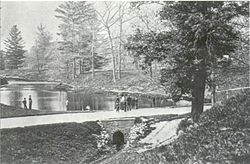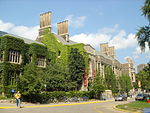Wycliffe College, Toronto
1877 establishments in OntarioAnglican seminaries and theological collegesColleges of the University of TorontoEducational institutions established in 1877Evangelical seminaries and theological colleges in Canada ... and 1 more
University of Toronto buildings
Wycliffe College () is an evangelical graduate school of theology at the University of Toronto. Founded in 1877 as an evangelical seminary in the Anglican tradition, Wycliffe College today attracts students from many Christian denominations from around the world. As a founding member of the Toronto School of Theology, students can avail themselves of the wide range of courses from Canada's largest ecumenical consortium. Wycliffe College trains those pursuing ministry in the church and in the world, as well as those preparing for academic careers of scholarship and teaching.
Excerpt from the Wikipedia article Wycliffe College, Toronto (License: CC BY-SA 3.0, Authors).Wycliffe College, Toronto
Hoskin Avenue, Toronto
Geographical coordinates (GPS) Address External links Nearby Places Show on map
Geographical coordinates (GPS)
| Latitude | Longitude |
|---|---|
| N 43.664444444444 ° | E -79.395 ° |
Address
Wycliffe College
Hoskin Avenue 5
M5S 3H3 Toronto
Ontario, Canada
Open on Google Maps









